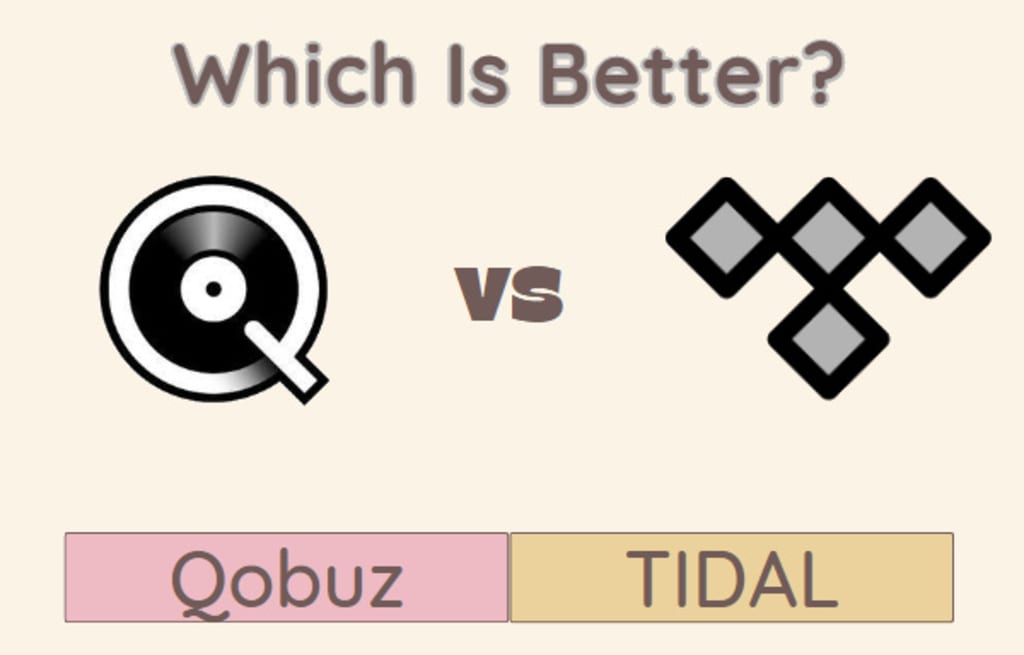
Qobuz is a French music service that was founded in 2007. It offers users the option to rent or purchase music and has gained popularity in recent years due to its superior audio quality and improving service. On the other hand, Tidal is also a music streaming service that focuses on large music library size and lossless audio quality. Then, with similar services, Qobuz vs. TIDAL, which is better? In this article, we will compare Qobuz with Tidal in a comprehensive review to determine which service is better.
Part 1. Music Catalogue and Exclusive Content
Part 2. Audio Quality
Part 3. Prices, Plans & Benefits
Part 4. Music Discovery & Recommendation
Part 5. Cross-Platform Compatibility
Part 6. User Interface and Features
Part 7. Social Feature
Part 8. Service Availability
Part 9. Conclusion: Qobuz vs. Tidal, Which Is Better?
Part 10. Extra Tip: How to Download Tidal Music to Computers?
Part 1. Music Catalogue and Exclusive Content
Both Qobuz and Tidal offer similar catalogs of high-quality music. However, there are slight differences between the two.
As of 2023, Qobuz claims to have over 100 million tracks available, with all tracks having the best quality. Additionally, 42,000 of the 100 million songs feature Hi-Res audio quality. Qobuz also offers a variety of songs, playlists, albums, podcasts, and interviews.
Tidal, on the other hand, boasts more than 100 million licensed tracks across all music genres. Additionally, it offers over 650 thousand music videos, radio stations, and interviews. All of the songs in Tidal's library have HiFi quality and more than 70 million tracks stream at MQA quality. Moreover, Tidal not only has music tracks in its library but also offers other audio and visual content that Qobuz does not yet have in its library.
In terms of exclusive content, both Qobuz and Tidal have their unique features.
Qobuz has an up-to-date, frequently updated exclusive content basis that is not fixed. In the past, Qobuz has offered some rare and unreleased albums, hi-res audio files and remastered tracks, classical music collections, concerts, events, early access to new releases, original interviews, and exclusive videos. These offers vary depending on different periods, geographic locations, and subscription plans.
Tidal is known for releasing albums early from artists such as Beyoncé, Kanye West, and Rihanna. It also has video content, including concerts, documentaries, and music videos, hi-fi streaming quality of lossless music, exclusive Tidal X concerts and events featuring popular artists, original podcasts, and editorial content, as well as new music discovery features, including curated playlists, and editorial content.
Part 2. Audio Quality
Both Qobuz and Tidal are high-resolution music streaming platforms that offer lossless audio quality up to 24-bit/192kHz, which is currently the highest quality that can be achieved with current technologies.
Tidal offers over 70 million songs in 24-bit/192kHz (9,216 kbps) or MQA (Master Quality Authenticated), while also streaming music at different qualities ranging from 96 kbps to 9,216 kbps based on the network connection, with four tiers: Normal, High, HiFi, and Master. The Normal quality is 96 kbps, the High is 320 kbps, the HiFi is lossless CD quality at 1,411 kbps, and the Master is for authenticated files from impeccable mastering processes ranging from 2,304 to 9,216 kbps.
Similarly, Qobuz provides all its tracks with at least lossless CD quality (16-bit/44.1kHz, or 1,411 kbps), and more than 80 million tracks with Hi-res quality. Qobuz's app also streams music at four tiers: MP3 with 320 kbps, CD-quality (16-bit/44.1kHz or 1,411 kbps), 24-bit Hi-Res with up to 96kHz (4,608 kbps), and 24-bit Hi-Res with up to 192kHz (9,216 kbps).
Part 3. Prices, Plans & Benefits
In this part, we collect some information for you about the plans, prices, and benefits of Qobuz and Tidal. Both services offer subscription options at different price points. You can get details from the information below.
Qobuz >>
Solo Duo Family
Studio $10.83/month $14.99/month $17.99/month
Sublime+ $15/month $22.49/month $29.17/month
*Note: The prices are for an annual single payment subscription counted in the month. If you subscribe to Qobuz for a month, the price will be higher, for example, that will be $12.99 for a monthly Studio Solo subscription. For more details, check Qobuz's price. Besides, the Studio plans offer one month free trial period, allowing you to test its functionality before committing to a plan.
When it comes to the benefits, all the Qobuz plans provide users with the benefits of streaming and downloading more than 100 million tracks, enjoying CD/Hi-Res quality (up to 24-bit/192 kHz, or 9,216 kbps), playing original editorial content, which is some interactive articles, exclusive content, and expert playlists that Qobuz publishes to widen your musical knowledge. If you get the Sublime plan, you not only can enjoy the previously mentioned benefits but also get discounts on Hi-res purchases. But Qobuz has not offered free, Student, or other plans yet.
Qobuz not only streams but also sells music. If you want to purchase music from Qobuz, you need to go to its digital store, then you will get DRM-free music to download to your local devices.
Tidal Music >>
Individual Family Student Military First Responders
Tidal Free Free Free Free Free Free
Tidal HiFi $9.99/month $14.99/month $4.99/month $5.99/month $5.99/month
Tidal HiFi Plus $19.99/month $29.99/month $9.99/month $11.99/month $11.99/month
Compared to Qobuz, Tidal offers a wider range of plans and discounts. Tidal provides three main subscription options, each with a discount available for specific credentials. High school and college students are eligible for a 50% discount, and military and first responders can also receive other discounts. Besides, all the Tidal paying plans allow users to try 30 days for free.
Tidal's benefits vary depending on your account type. With a Tidal free account, you can access 100 million tracks and sound quality of up to 160 kbps for free, albeit with ad interruptions. However, upgrading to a paid HiFi or HiFi Plus account grants you access to numerous benefits such as ad-free play, offline listening, live listening, the ability to connect to other platforms, tracking and sharing your listening habits, expert-curated playlists, and most importantly, higher sound quality. With the HiFi plan, you can experience sound quality of up to 1,411 kbps, while the HiFi Plus account allows for an even higher sound quality of up to 9,216 kbps.
In sum, Tidal is more friendly to people who have student, military, or other credentials. But if you individually want to enjoy songs and high quality only, then you can try Qobuz. But you have to tolerate fewer connections and shares since Tidal gives more features.
Part 4. Music Discovery & Recommendation
One of the primary goals of music streaming services is to help users discover new and exciting music that is both popular and matches their specific tastes within the vast music library available. By recommending personalized tracks, users can spend more time enjoying the music, rather than searching for it. Music discovery and recommendation features typically work by analyzing a user's listening behavior and suggesting similar or related artists, albums, or songs based on this data.
To provide its users better listening experience, Qobuz does apply such an algorithm. Qobuz will display personalized playlists, recommendations based on genres or moods, or new releases from artists the user has shown interest in. In addition, Qobuz gives you recommendation with 30 songs that it is tailored as a playlist based on your tastes and updates every Friday, named My Weekly Q. When you open the app, you can see some recommendations from Qobuz. There is a Discover section where you are shown curated playlists and albums based on your preferred genres. If you navigate to the Search section, you can also see the listening trends.
Tidal, according to the company's claims, its music discovery and recommendation feature is powered by a sophisticated algorithm that learns from listening habits and preferences. Based on this, the algorithm tailors recommendations to each user's unique musical taste. Tidal also offers curated playlists and categories to help users discover new music, such as "New Releases," "Rising," and "Moods." When you open the Tidal desktop app, you can also find the homepage shows curated playlists under the For you and Mixes for you parts. Additionally, Tidal editors give you some recommendations. You are also shown new tracks and albums. Besides, Tidal uses algorithms to gather big data from all its servers worldwide to show you some popular playlists, and some raising trends. There is a Tidal Rising section that highlights emerging artists worldwide and allows users to discover new music.
Overall, Tidal's music discovery and recommendation feature provides a comprehensive and personalized experience, offering users new music based on their tastes and the latest releases and popular trends within their country or region. Compared to Qobuz, Tidal's advanced algorithms give it an edge in music discovery and recommendation.
......
For more details, go through its original page.
About the Creator
Enjoyed the story? Support the Creator.
Subscribe for free to receive all their stories in your feed. You could also pledge your support or give them a one-off tip, letting them know you appreciate their work.





Comments
There are no comments for this story
Be the first to respond and start the conversation.